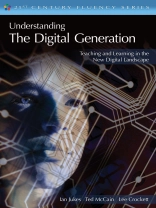An innovative look at reshaping the educational experiences of 21st-century learners!
Inspiring thoughtful discussion that leads to change, this provocative resource for teachers and administrators examines how the new digital landscape is transforming learners and learning. It makes the case for rethinking teaching processes in the face of these emerging developments within an environment of standards, accountability, and high stakes testing, and for providing informed leadership that supports 21st-century learning.
The book provides strategies, ideas, and compelling viewpoints to help leaders deepen their understanding of how educational thinking and instructional approaches must translate into relevant classroom experiences for today′s learners. Understanding the Digital Generation describes implementing educational approaches that build critical thinking skills, and discusses the role of digital media and technology used by students and how that fosters the crucial development of new 21st-century fluency skills. In reader-friendly terms, the authors provide:
- A comprehensive profile of digital learners′ attributes
- An exploration of the concepts of ‘neuroplasticity’ and the ‘hyperlinked mind’
- An approach to educational models that support traditional literacy skills alongside essential 21st-century fluencies
- An examination of appropriate methods of evaluation that encompass how digital generation students process new information
For staff developers leading study groups, this text provides powerful chapter-opening quotes, built-in questions, and additional tools to generate reflective dialogue and an open exchange of ideas.
İçerik tablosu
The 21st Century Fluency Project
Foreword
Introduction
Part I. Understanding the Digital Generation
1. The Need for Balance
2. The Problem of the Gap
3. What We Know About the Digital Generation
4. Learning Preferences of the Digital Generation
Part II. How Should Education Respond?
5. An Impending Tragedy
6. It’s Time to Catch Up
7. A Shift to Whole-Mind Instruction
8. Teachers Must Move Off the Stage
9. Teachers Must Let Students Access Information Natively
10. Teachers Must Let Students Collaborate
11. Teachers Must Teach Students Visually
12. Teachers Must Re-evaluate Evaluation
13. A Need for Balance and Leadership
Yazar hakkında
Lee Crockett is a national award-winning designer, marketing consultant, entrepreneur, artist, author, and international keynote speaker. He is the director of media for the Info Savvy Group and the managing partner of the 21st Century Fluency Project. Lee is a ‘just in time learner’ who is constantly adapting to the new programs, languages, and technologies associated with today’s communications and marketing media. Understanding the need for balance in our increasingly digital lives, Lee has lived in Kyoto, Japan, where he studied Aikido and the tea ceremony, as well as Florence, Italy, where he studied painting at the Accademia D′Arte.












